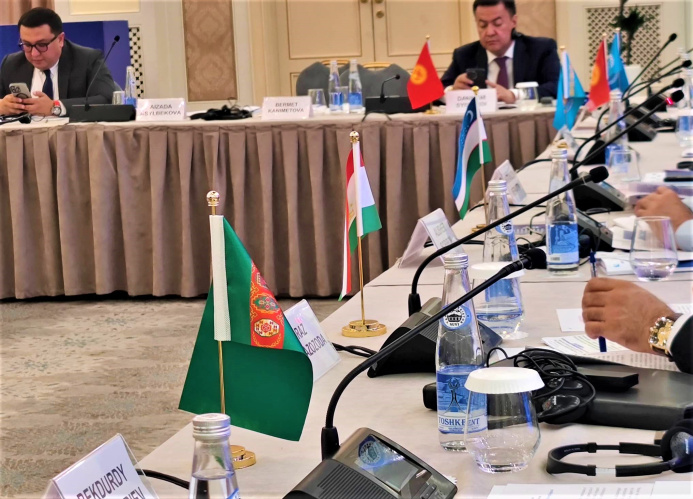The 8th Central Asian Expert Forum (CAEF) continues its work in Tashkent under the slogan "Central Asia — a common space of trust, security, and sustainable development." Today, on the second day of the forum, a scientific-practical conference was held, dedicated to the practical aspects of shaping regional identity in Central Asia.
During the conference, the Concept for the Formation and Strengthening of Regional Identity, prepared by the Institute for Strategic and Interregional Studies under the President of the Republic of Uzbekistan, was presented. This was followed by a lively discussion involving experts from Kazakhstan, Kyrgyzstan, Tajikistan, Uzbekistan, as well as leading analysts from Finland, the USA, the UK, Malaysia, and a number of international organizations, including the UN.
One of the conference speakers was Bekdurdy Amansaryev, an expert from the Scientific Center for Strategic Studies of the Institute of International Relations of the Ministry of Foreign Affairs of Turkmenistan. In his speech, he emphasized that in today’s world, full of turbulence and mutual distrust, issues of regional identity acquire not only cultural but also strategic significance.
The speaker quoted the words of the President of Turkmenistan, Serdar Berdimuhamedov:
"Central Asia is one of the cradles of world civilization. Today, the task is to create a unified political, economic, and cultural space in the region as a system of comprehensive, multifaceted interaction between our communities."
The Turkmen expert noted that the discussed Concept for the formation and strengthening of regional identity is not just a declarative document but a platform for concrete action. He stressed that its value lies in recognizing the historical and cultural unity of the region while respecting the sovereignty of each state, as well as in ensuring voluntariness and equality in the implementation of joint programs.
Key Aspects of the Concept
In his report, Amansaryev elaborated on several important sections of the document:
— Educational and informational frameworks. He stated that the Concept envisions creating a common humanitarian space, including through textbook exchanges and joint scientific publications. This, he said, would help achieve a "shared reading of the past" and pave the way for a common future.
— Cultural rapprochement. The expert noted that this is a way to "speak to each other and about ourselves in a shared language of cultural symbols." In this sphere, joint exhibition projects, digitization of cultural heritage, and the development of inter-museum cooperation are important.
— Work with youth. Special emphasis was placed on involving the younger generation in regional volunteer and educational programs to foster a "regional consciousness" in them.
— Synergy of humanitarian and economic aspects.Bekdurdy Amansaryev stressed that identity should be "living and useful" and closely connected with the economy, for example, through the development of cross-border tourism and the promotion of regional brands.
The Role of Turkmenistan in Implementing the Concept
The expert emphasized that Turkmenistan, thanks to its policy of positive neutrality, occupies a unique position in the region and is ready to act as a "bridge" between different approaches. He noted the country’s active participation in cultural and humanitarian initiatives, including promoting the idea of creating a Center for Regional Cultural Dialogue.
Turkmenistan is also ready to use its experience of peaceful coexistence and interethnic harmony to promote ideas related to the region’s ecological identity — primarily in the context of the Aral Sea problem and sustainable water use.
In general, Turkmenistan not only supports the conceptual provisions of the document but is also able to offer infrastructural, intellectual, and diplomatic resources for its implementation. In this context, specific proposals were voiced.
According to Bekdurdy Amansaryev, the discussed Concept is a chance for Central Asia to present itself as a unique civilizational model. He expressed confidence that its implementation will allow the region to "speak with one voice in a diversity of shades" with a shared intonation of confidence, peace, and mutual understanding.

